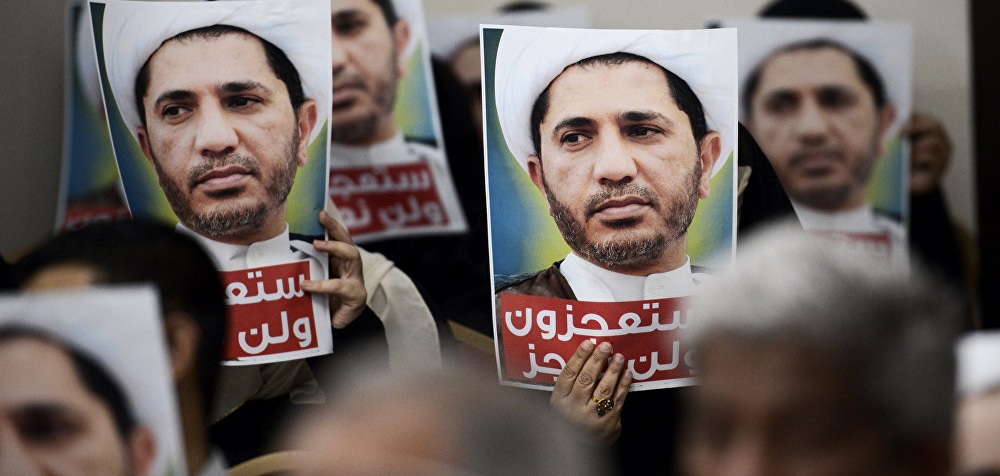Alwaght- On Monday, Bahrain’s Supreme Court upheld the life sentence for Sheikh Ali Salman, the head of the opposition movement al-Wefaq National Islamic Society, and two former members of parliament Sheikh Hassan Sultan and Ali al-Aswad, three of whom are charged “baselessly” with spying for Qatar.
In 2015, the 53-year-old Salman, was sentenced to four years in jail, after an unfair trial, on charges relating to speeches he made in 2012 and 2014, including at the Al-Wefaq General Assembly, in which he spoke about the opposition’s continuing determination to reach power in Bahrain, to achieve the demands of the 2011 uprising through peaceful means and to hold those responsible for committing human rights abuses to account. He also highlighted the need for equality for all Bahrainis, including the ruling family. His arrest took place a few days after he was re-elected for a fourth term as Secretary General of al-Wefaq.
In 2017, Ali Salman’s second trial began on a range of spurious intelligence-sharing charges relating to his recorded telephone conversations with the then Prime Minister and Minister of Foreign Affairs of the State of Qatar in 2011.
Sheikh Ali Salman was acquitted on 21 June 2018, but the prosecution appealed the ruling.
Bahraini Appeal Court on Monday found the opposition leader guilty and sentenced him to life in prison.
Is really Sheikh Ali Salman linked to Qatar for spying?
For nearly two years, Saudi, Bahraini, Egyptian, and Emirati relations to Qatar have been badly strained. In mid-July 2017, Saudi Arabia and its allies severed their diplomatic ties to Doha and imposed an all-out sea, air, and land boycott on the small emirate. Iran condemned the move, arguing that the humanitarian issues should not fall victim to the political disputes. The blockading states accused Qatar of supporting terrorism in the region and colluding with Iran to undermine what Saudi Arabia called the unified camp of Persian Gulf Arab states. Doha denied the Saudi allegations as baseless and argued that the hostile measures were a violation of its status as a sovereign state.
Analysts suggest that the anti-Qatari charges are mainly motivated by individual differences of each member of the Saudi-led bloc. For example, Bahrain in 2014 claimed that Qatar accepted Bahraini Sunni citizens who wished to change their citizenship to Qatari. The move, Manama said, was meant to reduce the number of the Bahraini Sunni citizens in a bid to allow the Shiites of Bahrain to remain a majority. According to the statistical data, of 1.5 million population of Bahrain 81 percent are Muslims. Of this percentage, 75 percent are Shiite Muslims, who are devoid of power in the politics and are exposed to grave social discrimination just because of their faith. The ruling regime has always feared the Shiite citizens’ demands and their anti-discrimination protests.
The constant protesters drove the rulers in Manama to attribute the organization of anti-government protests with majorly Shiite demonstrators to Qatar and Iran.
As a result, Al-Wefaq, due to its deep bonds to the whole majority of the Shiites, became the main target of threats. Last year, Bahrain Supreme Court banned and disbanded Al-Wefaq National Islamic Society as well as National Democratic Action Society for charges related to anti-government violence, incitement, and “terrorist activities.” But it did not seem that dissolution of the opposition parties will strip them of the power to influence the parliamentary elections of late November 2018. The Bahraini leadership tried to reopen Sheikh Salman and two of his colleagues’ espionage cases in a bid to distance them from their supporters and so steer clear of their influence on the public in the election.
But the opposition's reactions to the ban from the election not only challenged the judiciary’s jail rulings but also gave the protesters new reasons to continue their anti-regime demonstrations.
The analysts say that the upholding of the Sheikh Salman lifetime jail sentence despite lack of adequate evidence comes to intimidate the political opposition which still invite people to the streets in defiance of the governance crackdowns.
Dependence of the judiciary on the ruling family, unfair rulings based on unproven evidence, holding martial courts for political activists, torturing, and many other actions are the face of the regime’s clampdown on the peaceful protests, according to the international human rights monitoring groups including the Amnesty International.
Without foreign political and financial support, the Al Khalifa cannot issue such verdicts to the opposition leaders. Apparently, the regime has Saudi Arabia’s backing for its suppression of protests. The ruling regime, through forging charges against the opposition heads, seeks to show off to Riyadh its submission to the oil-wealthy monarchy in the anti-Iran and Qatar posture.
Therefore, beside the significance of life sentence ruling to Al-Wefaq secretary-general, the type of charges reveals the nature of it being a regional game, certainly designed by the behind-the-scenes Saudi hands.



























